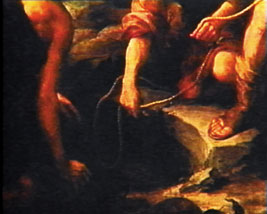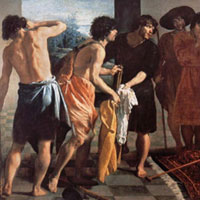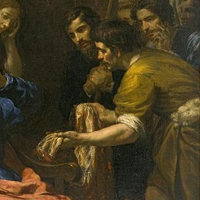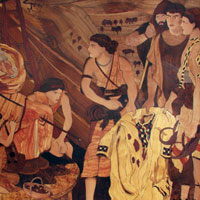Prophet Yusuf (as) had a dream when he was still a child and asked his father what it meant. His father, the Prophet Ya'qub (as), interpreted the dream and gave him glad tidings. He also warned Yusuf (as) against telling his brothers about it. This event is described in the Qur'an:
When Yusuf told his father, "Father! I saw eleven bright stars, and the sun and moon as well. I saw them all prostrate in front of me." He said, "My son, don't tell your brothers your dream lest they devise some scheme to injure you, satan is a clear-cut enemy to man. Accordingly your Lord will pick you out and teach you the true meaning of events and perfectly fulfil His blessing on you as well as on the family of Ya'qub as He fulfilled it perfectly before upon your forebears, Ibrahim and Ishaq. Most certainly your Lord is Knowing, Wise." (Surah Yusuf: 4-6)
 |
Prophet Yusuf (as) dreamt of 11 stars, the sun and moon prostrating themselves before him. The illustration shows a representation of this. |
The reason why his father warned Yusuf (as) not to tell his brothers about the dream lay in their behaviour, which failed to inspire any confidence. As a man of wisdom and perception, Prophet Ya'qub (as) was aware that his sons possessed the kind of character that gave rise to strife and jealousy. Knowing them as well as he did, he guessed that they might well lay a trap for Yusuf (as). For that reason Prophet Ya'qub (as) warned Yusuf (as) of the enmity of satan and recommended that he be on his guard.
The lesson to be drawn from this is that Muslims need to be careful around people who sow discord and mischief and people who are lax in matters of religion, and not to tell such people about pleasing developments or good future prospects for the Muslims. That is because truly devout people are pleased when Muslims receive a blessing, grow stronger or generally come into a favourable position, whereas sowers of mischief are greatly distressed by it. Since such people have no wish to see anything benefiting the religion and its believers, they try to prevent such things happening and even collaborate with the enemies of the believers in order to bring this about. Allah describes the behaviour of mischief-makers:
If good happens to you it galls them. If a mishap occurs to you, they say, "We made our preparations in advance," and they turn away rejoicing. (Surat at-Tawba: 50)
That is why such people should not be told of pleasing and auspicious developments regarding Muslims before they actually happen, and that is why people of that type should be treated with great caution. Prophet Ya'qub's warning to his son Yusuf (as) is one clear example of this.
Prophet Ya'qub (as) was right to warn his son. The other brothers were jealous of him and his youngest brother. This envy burned so fiercely within them that it led them to lay a trap for Yusuf (as). This is yet another indication that the behaviour of Yusuf's brothers was far removed from the moral values of Islam and that they were failing to display the character of true believers. The trap they set and what they did to Prophet Yusuf (as) are related in the Qur'an:
When they declared, "Why! Yusuf and his brother are dearer to our father than we are although we constitute a powerful group. Our father is clearly making a mistake. Kill Yusuf or expel him to some land so that your father will look to you alone and then you can be people who do right." (Surah Yusuf: 8-9)
 |
A painting of the Prophet Ya'qub (as) and his children. The main motivation behind the trap his brothers set for Prophet Yusuf (as) was jealousy. It was the fact that they believed that their father loved Yusuf (as) and his brother more than he did them that spurred this jealousy. |
As appears quite clearly from these verses, envy was the principle motivation behind the trap that Yusuf's brothers laid for him. It was the thought that their father loved Yusuf (as) and his brother more which led them to this jealousy. They wanted a love directed only towards themselves, and thought, because of their numbers and the way that they encouraged one another, that they had a greater right to that love.
This is clearly a most twisted way of thinking. According to the Qur'an, the real measure of a believer's love is the degree to which it is motivated by God concsiousness. Whoever is most conscious of Allah has most fear of Him and scrupulously remains within the limits of behaviour set by Him. Hence, the people they love the most are those who exhibit the most upright moral values. That is the believer's concept of love. It is evident that Prophet Ya'qub (as) adopted that same criterion when giving love to his sons. It is perfectly natural that since Prophet Yusuf (as) was more God fearing and possessed higher moral values than his other sons he should have loved him most. However, since Prophet Yusuf's brothers (as) did not share that perspective they were unable to understand the love their father felt for Yusuf (as) and their youngest brother. This is an important indicator of how far their characters had deviated from their religion.
Another aspect of their behaviour that is worthy of note is the disrespectful way they treated their father. Despite their father being a chosen prophet and a man of superior intelligence and understanding, they claimed that their father was "clearly making a mistake" because of his love for Yusuf (as) and his brother. This impudence towards a prophet shows just how weak their faith was. Furthermore, the way they attempted to kill Prophet Yusuf (as) is proof again of the weakness of their faith and their mischief-making natures. It is quite evident that nobody who fears Allah, who believes he will have to account for his actions in the hereafter, and who knows that Allah sees and hears him at every moment could ever favour taking such a course of action, and would never even consider it for a moment. Yet in order to make their father love them or to satisfy their feelings of jealousy, these men believed the answer was to kill Prophet Yusuf (as) or abandon him somewhere on the road.
Killing is in any case a sin, and abandoning a young child by the roadside is a wicked action. People who could even consider doing such a thing clearly have no conscience or sense of compassion. Prophet Yusuf's brothers (as) were therefore, cruel and ruthless.
Their thought processes were also totally defective. They hoped that after committing such a sin and doing such a wicked thing to Yusuf (as) they could still remain one of those "who do right." Of course if someone truly wishes Allah to forgive him after he has transgressed he may still hope to amend his ways and be one of the God fearing. However, these men hoped to remain one of the God fearing even in the full knowledge that their actions were wrong. This is another piece of evidence that they lacked the power of reason and the character of the true believer.
 |
Another representation of Prophet Yusuf's brothers. Their jealousy of the Yusuf (as) was so fierce that they were able to ruthlessly throw him into a well, despite his youth. |
It can be seen in the continuation of the verse that in moments of extreme peril Allah assisted Prophet Yusuf (as), inspiring his brothers to throw him down a well instead of murdering him:
One of them said, "Do not take Yusuf's life but throw him to the bottom of the well, so that some travellers may discover him, if this is something that you have to do." (Surah Yusuf: 10)
As we have seen, no matter what plans they came up with regarding Prophet Yusuf (as) and no matter what traps they laid for him, the prophet was always subject to the fate that Allah had set out for him. Nobody can ever thwart the destiny he has been apportioned. Allah had shaped the destiny of Prophet Yusuf (as) before he was even born, and the prophet experienced that destiny in exactly the way that Allah had set it out.
We must be aware at this point that it was not the brother who enabled Yusuf (as) to survive by suggesting they throw him down a well, but that it was Allah Who prevented his death. Had Allah so wished, He might never have given that brother the idea of throwing Yusuf (as) down the well. However, it was written as Prophet Yusuf's destiny that they should have planned to murder him but then dropped him down the well instead. That was why this brother thought of the idea. The common notion of someone cheating their fate is out of the question. Prophet Yusuf's fate (as) had been determined down to the finest detail. The fact they did not kill him did not result from the fact their plan had gone wrong, but rather that Allah had planned otherwise right from the start.
In fact, Allah had revealed that plan to him in his dream when he was still a child. The life of Prophet Yusuf (as) then unfolded in such a manner as to confirm the veracity of that dream. Allah may sometimes give certain of His servants indications regarding the future. He revealed to the Prophet Muhammed (saas) in a dream that he would capture Mecca and go on a pilgrimage there with the faithful in complete safety. The verse in question reads:
Allah has confirmed His Messenger's vision with truth:"You will enter the Kaaba in safety, Allah willing, shaving your heads and cutting your hair without any fear." He knew what you did not know and ordained, in place of this, an imminent victory. (Surat al-Fath: 27)
The key to understanding Allah's ability to reveal the hitherto "unknown" with events transpiring in exactly the way He revealed them, is to appreciate that everything that is unknown to us has already taken place in the timeless presence of Allah , and is already over and done with. The "unknown" applies to human beings. It is Allah, Who is unconfined by time and space, Who creates and knows everything. He has created all of time and all of history as a single instant.
We must not forget this truth as we move on to consider the next part of Prophet Yusuf's (as) life story. Everything that happens does so in line with the will of Allah, and for believers there is good in everything that takes place. Following every difficulty and tribulation requiring patience, Allah gives well-being and blessings in this world as well as recompense in the hereafter. For that reason, events that appear to be "evil" from the outside, such as being enslaved, thrown into prison and slandered, are actually all auspicious for believers.
In the Qur'an, Allah reveals that Prophet Yusuf (as)'s brothers concocted a cunning plan against him, one which they then set in motion. In order to make their plan a reality they first asked their father, Prophet Ya'qub (as), to send Yusuf (as) along with them and then set about convincing him, even though they were aware that he distrusted them:
They said, "Our Father! What is wrong with you that you refuse to trust us with Yusuf when in truth we only wish him well? Why don't you send him out with us tomorrow so he can enjoy himself and play about? All of us will make sure that he is safe." (Surah Yusuf: 11-12)
 |
Prophet Yusuf's brothers around the well they threw him into. They are unaware of what awaits them as they drop him into its depths. However, everything happens according to the fate decreed by Allah. |
As can be seen from the way the verse is expressed, their father was reluctant to send Prophet Yusuf (as) along with them and even allowed them to sense his lack of trust in them, putting them straightaway on the defensive. They maintained that they wanted only what was good for Yusuf (as). The fact that they were able to tell such a lie so easily while preparing to kill him or abandon him down a well, is evidence that mischief-making people have no difficulty in lying. In fact, they continued lying, saying that they wanted Yusuf (as) to accompany them for his own enjoyment. They also promised to protect and keep an eye on him. Another matter worthy of close attention here is the way that mischief-makers always try to portray themselves as well-intentioned. The way they claimed they wanted what was best for Yusuf (as), giving the impression they were thinking solely of his own good, was part of their cunning natures. However, Prophet Ya'qub (as) was a perceptive and wise individual and he could clearly see the untrustworthy nature of their characters:
He said, "It grieves me to let him go with you I fear a wolf might come and eat him up while you are heedless, not attending him." They said, "If a wolf does come and eat him up when together we make up a powerful group in that case we would truly be in loss!" (Surah Yusuf: 13-14)
It was because Prophet Ya'qub (as) did not trust his sons and guessed that they would wrong Yusuf (as) that he expressed these misgivings. He guessed that they would do harm to Yusuf (as) and then come back to him after having prepared some form of excuse. They fiercely opposed this idea and tried to convince him that nothing of the sort would happen. This is another technique that people with mischief-making characters frequently resort to. In fact, their insincerity emerges in the next part of the story from the words they spoke:
That night they came back to their father in tears, saying, "Father, we went out to run a race and left Yusuf together with our things and then a wolf appeared and ate him up but you are never going to believe us now, not even though we really tell the truth." (Surah Yusuf: 16-17)
 |
In this painting can be seen Prophet Yusuf's brothers telling their father Ya'qub (as) that a wolf had eaten Yusuf (as) and showing him a bloody shirt as false evidence. |
As can be seen, the course of events was just as Prophet Ya'qub (as) had expected. The behaviour of Yusuf's brothers confirmed the correctness of the doubts their father felt regarding them. The fact they came weeping was a clear sign of the corruptness of their behaviour. The fact is that such a weak attitude is one that no believer could ever accept. Since believers know that there is good and auspiciousness in everything, they never fall into the weakness of lamenting or complaining, no matter what may befall them.
Moreover, the lamentation engaged in by Yusuf's brothers was of the kind that those of a hypocritical character employ. Using tears as a weapon to deceive the other side is one of the mischief-makers' cunning techniques. In this way they try to make other people feel sorry for them and portray themselves as helpless. They try to give the impression that they are trustworthy when they are really nothing of the sort. This is an unchanging feature of the character of the mischief-maker down the ages. The fact is that Yusuf's brothers felt not the slightest twinge of conscience as they flung their brother, a small child, into the depths of the well, yet when the time came to give an account of themselves they came weeping into their father's presence. It is obvious that they were quite insincere and that their tears were put on.
This situation is a means for believers to gain valuable insights. When careful attention is paid to the lie the brothers made up about Prophet Yusuf (as), the concern expressed by Prophet Ya'qub (as) is perfectly understandable. His sons had come with excuses, just as he himself had said. Prophet Ya'qub (as) had clearly expressed his concerns in his earlier words, saying that he was afraid of Yusuf (as) being eaten by a wolf. His sons, true to the character of mischief-makers, incorporated that concern into the lie they told to their father after throwing Yusuf (as) down the well. They thought that their father might thus be more likely to believe them. The lesson that believers need to draw from this story is to avoid expressing their sincere doubts or concerns within earshot of mischief-makers. This is because, as we have seen in this example, they might use the believers' sincere words against them.
 |
In a film about Yusuf (as), the brothers are shown trying to portray themselves as trustworthy, together with Prophet Yusuf's shirt which they had falsely bloodied. |
As can be seen from the continuation of the verse, they were actually aware that their father did not believe them. This situation results from a state of mind that applies not just to Prophet Yusuf's brothers, but to everyone of a hypocritical nature. Those who set snares for believers feel themselves in a permanent state of guilt. They can’t help thinking about their actions, and even mentioning them. They use constructions such as, "You will never believe us even though we are really telling the truth," which no honest person would ever resort to. This makes their lack of self-confidence perfectly clear, which in turn stems from their inability to display the character and moral values of the believer. In the Qur'an Allah gives an example of the mischief-makers' false and exaggerated way of speaking:
When the hypocrites come to you they say, "We bear witness that you are indeed the Messenger of Allah." Allah knows that you are indeed His Messenger and Allah bears witness that the hypocrites are certainly liars. They have made their oaths into a cloak and barred the Way of Allah. What they have done is truly evil. (Surat al-Munafiqun: 1-2)
As we have seen, a method of self-defence for mischief-makers is to attempt to "make their oaths into a cloak," in other words swearing something is true when it is actually false. Believers, on the other hand, trust one another's words and never feel any doubt. Furthermore, mischief-makers are unable to do believers any harm, even if they imagine that they have deceived those believers. Allah describes their situation in this verse:
Among the people there are some who say, "We believe in Allah and the Last Day," when they are not believers. They think they deceive Allah and those who believe. They deceive no one but themselves but they are not aware of it. (Surat al-Baqara: 8-10)
Prophet Yusuf's brothers were, in fact, perfectly well aware that they were not in the least bit credible. That was why they produced false evidence, they were hoping that it might make them seem more convincing. They covered Yusuf's shirt in blood and took it to their father, trying to give the impression that he was actually dead.
This incident is an indication that those who lay traps for Muslims are also capable of producing falsified evidence in furtherance of their conspiracies. In the light of the need to be aware of and prepared for such methods, it is essential to examine the proposed "evidence" very carefully since Allah has stipulated:
You who believe! If a deviator brings you a report, "scrutinize it carefully"... (Surat al-Hujurat: 6)
However, Prophet Ya'qub (as) very definitely refused to believe them, realised what they were up to and clearly stated that it was all a lie which they had prepared:
They then produced his shirt with false blood on it. He said, "It is merely that your lower selves have suggested something to you which you did; …" (Surah Yusuf: 18)
 |  |  |
The shirt over which Prophet Yusuf's brothers poured false blood and then showed to their father depicted in historical paintings. | ||
By telling his sons that their lower selves had deceived them and led them to take such actions, Prophet Ya'qub (as) was drawing attention to the fact that people can indeed do very terrible things if they follow the inclinations of their desires, that bodily appetites are deceptive and that all such evils stem from people's following those appetites. This is another fact that believers need to consider very deeply. Earthly desires lead people to evil, and everyone needs to be cautious and on guard at all times, listening to the voice of his conscience and not that of his lower self. Furthermore, another piece of wisdom that appears in this verse is that mischief-makers are motivated by their lower selves.
One of the most striking points here is the modest behaviour of Prophet Yusuf (as). That behaviour is an important example of the way believers must place their faith solely in Allah and have fortitude, no matter what conditions they face. As we have seen, Prophet Ya'qub (as) was actually quite well aware that his sons had set a trap for Yusuf (as). However, behaving with enormous tolerance and moderation, he sought help from Allah. These words he spoke to his sons, once again reveal what a God fearing and patient individual he was:
… [For me] beauty lies in showing steadfastness. It is Allah alone Who is my Help in face of the event that you describe. (Surah Yusuf: 18)
There is one most important matter that we must not forget as we read about the events in the life of Prophet Yusuf (as)–as he underwent these events he was always aware that Allah was by his side, and that He heard and saw his brothers as they were setting the trap for him. Allah reassured Prophet Yusuf (as):
But when, in fact, they did go out with him and gathered all together and agreed to put him at the bottom of the well, We then revealed to him that: "You will inform them of this deed they perpetrate at a time when they are totally unaware." (Surah Yusuf: 15)
The above verse emphasises two further points. The first is the way that his brothers collaborated as they threw Prophet Yusuf (as) into the well. Perhaps they imagined they could assume joint responsibility for the act but their thinking was very mistaken. Rather, their behaviour merely proves that they shared a common lack of conscience since not one of them stood out against the course of action they had taken.
One may conclude from this not only that troublemakers are capable of taking organised action against believers, but that they also constitute the perfect material for mass communal protests.
 |
"O truthful Yusuf, tell us of seven fat cows which seven thin ones ate and seven green ears of wheat and some others which were dry so that I can return to them and let them know." (Surah Yusuf: 46) |
Moreover, it can be seen in the above verse that Allah assisted Prophet Yusuf (as) by means of His revelation, giving him news of the future even at what appeared to be his darkest hour. This is in itself a miracle. Looking at this from the point of view of Prophet Yusuf (as), this was a great blessing. Receiving a revelation from Allah when he was about to be thrown into the well and receiving Allah's reassurance was the greatest help and support that he could possibly have. In other words, right from the moment he was thrown into the well, Prophet Yusuf (as) knew by Allah's revelation to him that all their snares would come to nothing. He was secure and at peace because of his trust in Allah's promise.
However, it must not be forgotten that a sincere believer always places himself in Allah's hands, no matter what the difficulties and tribulations he faces, even if he is given no revelation, and accepts whatever happens. That is because Allah has informed the believers that He will always be by their side:
... Allah will not give the disbelievers any way against the believers. (Surat an-Nisa': 141)
Nobody who sincerely believes in this promise of Allah's can ever be concerned at the traps set by mischief-makers and unbelievers.
The superior nature of Prophet Yusuf (as) stems from his moral values and submission to the will of Allah. Although he was still a young child, he was very mature. We need to consider what being thrown down a well would really have been like for such a small child. The verse speaks of him being thrown into the depths of the well, which means that he was somewhere dark. It was a place where the threat of death was close, and it was uncertain whether he would ever be found or not. Neither could he know what kind of people, if any, would find him, and whether they would be good or bad. Someone who lacks submission to the will of Allah may have great difficulties and be wracked by doubts in such circumstances. Yet despite all this, Prophet Yusuf (as) was patient and submissive to the will of Allah. This is a clear indication of his superior consciousness. It is also obvious from the fact that he was tested in this way at such an early age meant that he would grow up to be one of the chosen ones, since only those who are sincerely devoted to Allah and submit themselves to His will can pass such tests.
 |
Prophet Yusuf (as) was thrown into a well by hiss brothers when he was very young. What is more, it was uncertain whether he could be rescued from the well or not. In spite of this, Prophet Yusuf (as) shows an attitude of great patience and trust in Allah. |
On the face of it, the circumstances in which Prophet Yusuf (as) found himself seemed truly terrifying. He was being put through a difficult trial. However, in the light of the verse,"For truly with hardship comes ease..." (Surat al-Inshirah: 5) Allah assisted him and made him a promise that comforted him and gave him peace and security.